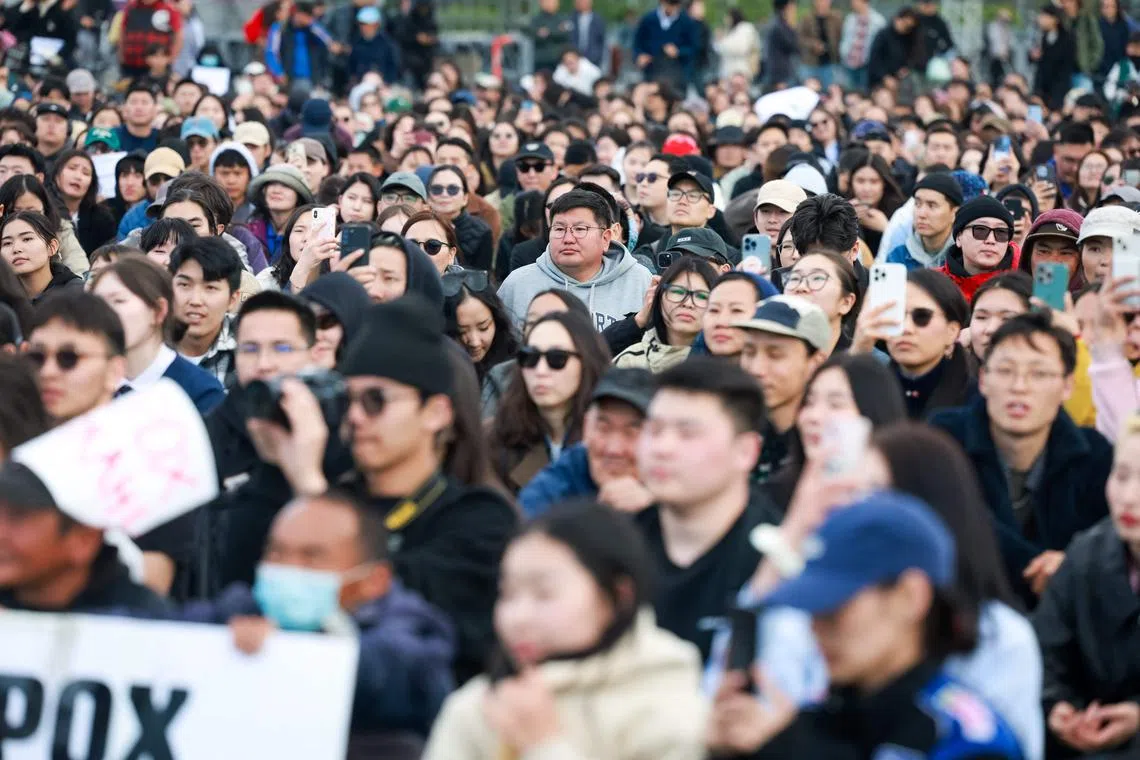Mongolia PM resigns after weeks of anti-corruption protests
Sign up now: Get insights on Asia's fast-moving developments

Protesters rallying to demand the resignation of Prime Minister Luvsannamsrain Oyun-Erdene, in Ulaanbaatar, Mongolia.
PHOTO: AFP
ULAANBAATAR - Mongolian Prime Minister Luvsannamsrain Oyun-Erdene resigned on June 3, following weeks of anti-corruption protests in the country’s capital.
The landlocked democracy in northern Asia has battled deep-seated corruption for decades, with many arguing that wealthy elites are hoarding the profits of a years-long coal mining boom at the expense of the general population.
Frustrations have flared since May as public suspicions over the supposedly lavish lifestyles of the Prime Minister’s family have fuelled persistent demonstrations in the capital Ulaanbaatar.
Mr Oyun-Erdene announced his resignation on June 3 after losing a confidence vote among lawmakers, according to a parliamentary statement.
“It was an honour to serve my country and people in times of difficulties, including pandemics, wars and tariffs,” he said after the result of the secret ballot was announced in Parliament.
Mr Oyun-Erdene will remain as caretaker prime minister until his successor is appointed within 30 days.
Hundreds of young people converged on the square outside the Parliament building on June 2, marching with white placards and chanting: “Resignation is easy.”
Several protesters said they came to voice dismay at what they described as deeply embedded corruption and social injustice.
But Associate Professor Julian Dierkes, a Mongolia expert at Germany’s University of Mannheim, said he “(doesn’t) expect any successor to adopt substantially different policies” from Mr Oyun-Erdene, including on corruption.
His ouster “may mean the resurgence of factional politics in his party” after years of comparative stability at the top of Mongolian politics, Prof Dierkes told AFP.
Secret ballot
Mr Oyun-Erdene has denied the corruption allegations, and in an address to Parliament before the vote, blamed “major, visible and hidden interests” for waging an “organised campaign” to bring down the government.
He had also warned of political instability and economic chaos if forced out of power.
But it was not enough, as only 44 lawmakers voted to retain confidence in him, with 38 against.
That did not reach the 64-vote threshold required from the 126-seat Parliament, prompting Mr Oyun-Erdene to stand down.
The move has pushed the country’s fractious political scene into further uncertainty.
Mongolia has been ruled by a three-way coalition government since elections in 2024 resulted in a significantly reduced majority for Mr Oyun-Erdene’s Mongolian People’s Party (MPP).
But the MPP evicted the second-largest group, the Democratic Party (DP), from the coalition agreement in May after some younger DP lawmakers backed calls for Mr Oyun-Erdene’s resignation.
DP lawmakers walked out of the parliamentary chamber during the confidence ballot.
Time for change
Further demonstrations were expected in central Ulaanbaatar on June 3, according to AFP reporters in the city.
Since Mr Oyun-Erdene took power in 2021, Mongolia has plummeted in Transparency International’s Corruption Perceptions Index.
Concerns over the economy and rising living costs have also stoked the unrest.
Some counter-protesters – overwhelmingly older than their pro-opposition counterparts – also turned out to support the Prime Minister.
Speaking on June 2, protest organiser Ulamsaikhan Otgon, 24, said the weeks of demonstrations “have showcased throughout that young people are very sensitive to unfairness” in society.
Yroolt, a 30-year-old content creator, who declined to share his surname for privacy reasons, said young people “want a different life, a different society”.
“We all know injustice is deeply embedded in our society but it’s time for change.” AFP


